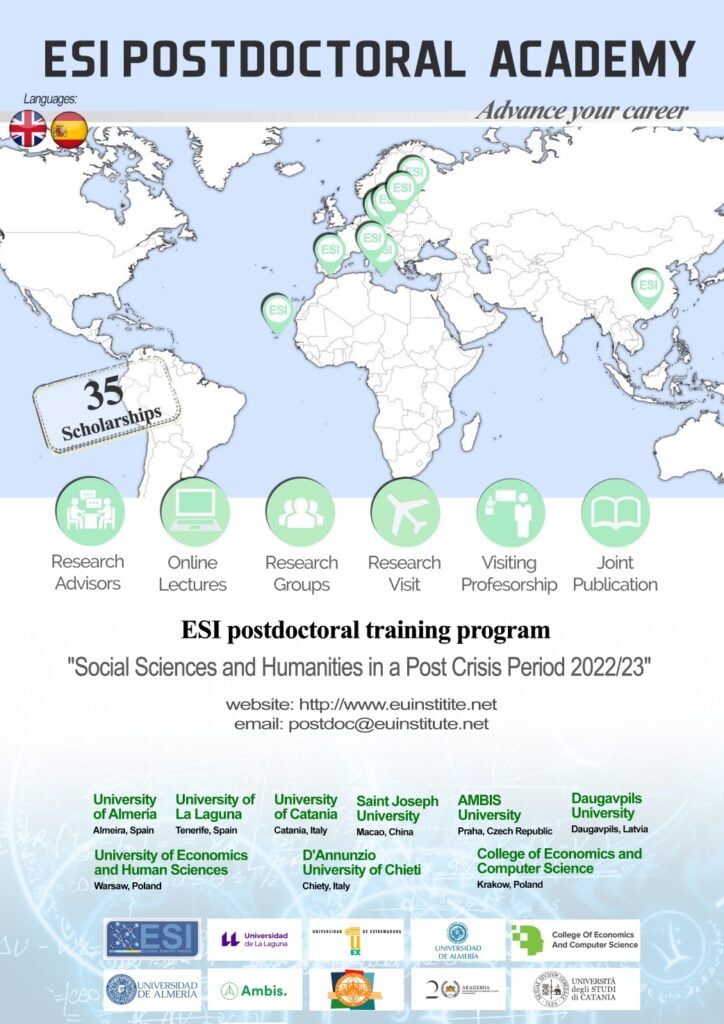ESI POST-DOCTORAL PROGRAM 2024/2025
"Computer Sciences and Engineering, CSE"
"Life and Natural Sciences in a Post-crisis Period"
This postdoctoral program in “Computer Sciences and Engineering, CSE” and “Life and Natural Sciences in a Post-crisis Period” is organized by the European Scientific Institute, ESI, in cooperation with its partner universities. It hosts PhD holders who are interested in upgrading their academic careers by working on a specific research topic in a multidisciplinary environment and the developing area of computer sciences and engineering; agriculture, astronomy, botany, zoology, ecology, biology, chemistry, earth sciences, mathematics, physics, medicine, and their sub-domains.
The ESI postdoctoral program will enhance the mobility of academic staff and strengthen academic cooperation through ESI Masterclasses, work under the guidance of an academic advisor, working in research groups, research visit at one of the host Universities, guest lectures, and joint publications of research articles. It will contribute to knowledge sharing and sharing of best practices among candidates, their research advisers as well as the ESI network of experts.
Languages of the program are English and Spanish.
In times full of challenges with the ongoing COVID-19 pandemic, the world, more than ever, needs further scientific discoveries. Every selected fellow will deal with a specific societal challenge through attending masterclasses while leaving time for guided research. The interdisciplinary cooperation of the program is provided through academic activities with researchers from different universities and academic backgrounds.
The academic output of every candidate will be published under the principles of open access and open science. The program supports the concept that scientific publications are free for usage.
ESI Schedule
"Computer Sciences and Engineering, CSE" "Life and Natural Sciences in a Post-crisis Period"
Place: Online plus Research Visit at one of the Host Universities.
Research Visit:
At least 2 weeks in Spain, Italy, or Poland (May 2024).
The University of La Laguna, Tenerife (Spain), University of Catania (Italy), College of Economics and Computer Science (WSEI), Krakow, Poland.
Academic Domains:
Computer sciences and engeneering; agriculture, astronomy, botany, zoology, ecology, biology, chemistry, earth sciences, mathematics, physics, and their sub domains.
Start: March 1, 2024 End February 28, 2025
Program Activities and Structure
For the online module activities press here.
The training program consists of three (3) semesters and will be held mainly online.
During the 1st semester, the candidate will have meetings with the research group selected by the organizer. Meetings with the research adviser(s) will also be held online and every semester. During this semester, a short course on good research practices and academic writing will be organized, where researchers will share their knowledge and discuss the recent developments in the area of academic publishing. The candidate will also attend the ESI masterclasses and workshops delivered by the ESI network of experts.
- Creating the research working group and 2 meetings
- Meeting with the research advisor (at least 2)
- Attending the ESI Masterclasses
- Attending the academic writing course
- Presenting the draft paper (at a conference or to the research advisor)
During the 2nd semester, the candidate will work on the data mining through surveys or/and interviews in order to provide a dataset for the research. The candidate may also become part of the organizing committees of the ESI academic conference or forum. During this semester, the candidate visits the Host University and works on a joint research article or a book chapter together with the research adviser(s) and the members of the working group. If more candidates are working on the same or similar topic at the same Host University, they can organize meetings and workshops as well as joint research analysis and activities.
- Data-mining for the working paper
- Attending the ESI masterclasses
- Meeting with the working group
- Meeting with the research advisor
- Research Visit (Spain, Italy, or Poland in May every year)
- Guest lecture (not mandatory)
- Presenting the working paper at the ESI conference
- Participating in the Organizing Committee of one of the ESI Annual Conferences (not mandatory)
In the 3rd semester, the candidate is involved in preparing the research proposal and writing the working paper. If chosen and approved by the organizer, the candidate can complete the research visit during the 3rd semester of the program. The process is followed by discussion in the research group, the program group of experts, and guidance by the research adviser(s). During the last semester, the candidate presents the final version of the paper at online or in-person conferences and submits the paper for publication.
- Meeting with the research advisor (2 at least)
- Meeting with the working group
- Attending program lectures
- Publication of the paper
ESI Program Organizer
The European Scientific Institute, ESI, is in charge of the full logistics and communication with the applicants and candidates during the program.
The ESI will provide an adequate group of experts in various fields who will not only deliver their lectures for the program`s purposes but will also be available for advice and opinions.
The organizer shall provide free participation of the candidates to the suggested list of international academic conferences and workshops.
The organizer shall suggest open access academic journals for publication of the academic output of each candidate.
Upon agreement with the Host Universities, the organizer will provide access to libraries and databases.
Together with the program director at the Host University, the organizer will provide the necessary information and assist the candidate with documents for visa application (if required).
Research Advisers
The research adviser is a Professor at one of the Host University Departments or a member of the ESI group of experts. The research adviser monitors the academic activities of the candidate by providing suggestions regarding the research methods and preparation of the working paper. He or she may also participate in the research activities and be enlisted as a co-author of the academic output of the candidate.
The Host University and the Organizer of the program, taking into consideration the research topic and the availability of the researchers at a given moment, select the research adviser(s) for each candidate.
The Organizer may also suggest to the candidate to cooperate with other research advisers.
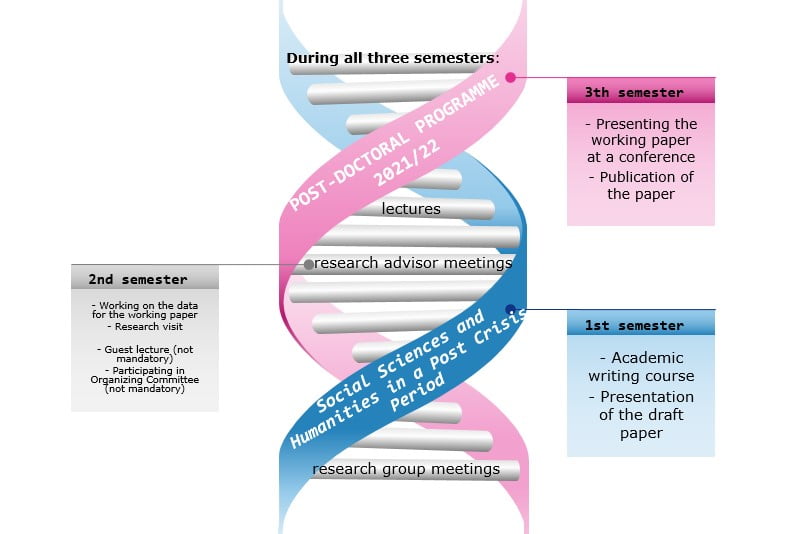
Certificates
Certificate for successful completion of the ESI postdoctoral training “Computer Sciences and Engineering, CSE” and
“Life and Natural Sciences in a Post-crisis Period” will be awarded to the candidate after completing the 3rd semester.
The European Scientific Institute, ESI, will issue the certificate.
Depending on the host University, some certificates will also contain the host university logo. However, in any case, the host university will issue a confirmation for the research stay and academic activities of the candidate.
– Additional documents which describe the concrete academic activities of the candidate will be issued.
ESI Masterclass
In the past 10 years, the European Scientific Institute, ESI, has created a wide network of experts from different universities worldwide covering various academic domains. For the purpose of the program, every month, ESI will invite an experienced Professor who will deliver an online or in-person lecture on a cutting-edge topic. The program aims to invite scholars who address topical issues from a multi or interdisciplinary perspective. The aim of these lectures is to promote intellectual curiosity on the various ways we can study human societies. Hence, speakers are not expected to directly talk about the topics of any particular candidate, but they should be a source of inspiration and widen one’s intellectual horizons.
ESI Working Groups
ESI research groups are organized on a multidisciplinary basis to bring together Fellows from different disciplines working on a similar range of issues. The groups will meet regularly during the duration of the training. The regular meetings of the groups will consist of presentations of the work in progress and the discussion of more general research issues, such as the reading of key or recent works related to the group’s theme.
ESI Annual Conference
Each year, the program hosts one major conference organized at one of the Host Universities or Online. One aspect of the conference will be focused on research funding and in writing grant proposals. However, the other focus of this conference will be virtual or in person meeting with the other ESI fellows, presentation of the research activities to each other, and discussion of potential cooperation.
Working Papers
A compulsory part of the training for every candidate is creating a Working paper. The working paper should be in the format of a scientific article or a book chapter. It should be prepared and ready for submission. This working paper will be posted at one of the Host University repositories or in a preprint repository and ready to be submitted for publication. However, when a candidate is not motivated to make the content public, he/she should contact the organizer of the program explaining the reasons for the exception.
Research Visit
During the second semester of the program, each candidate will visit one of the Host Universities. The minimum period of the research stay is 2 weeks. The host University will offer its amenities and other services whenever possible. Each candidate will choose one of the following Host Universities for the Research Stay:
ESI Training 2024/2025 Host Institutions
- University of La Laguna, Tenerife, Spain
- Univrsity of Catania, Italy
- Roma Tre University, Italy
- College of Economics and Computer Science (WSEI), Krakow, Poland
The candidate will be attached to one of the Host University Departments. Depending on the accepted topic and the availability of the academic staff, the Host University will suggest one or more researchers who will work closely with the candidate in the course of the program.
The candidate will complete a research visit at one of the Host Universities within a period of at least 2 weeks. The research visit will be organized in line with the COVID-19 protocols.
Upon mutual agreement, the candidate may be offered to deliver lectures for the students at the Host institution. However, the Host Institution is not obliged to make any payments to the candidate for his/her academic activities.
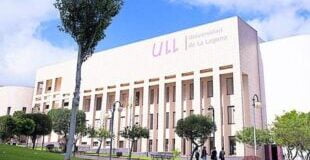
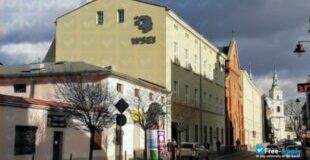
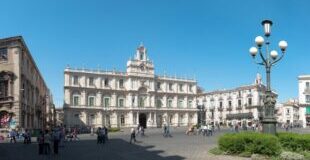
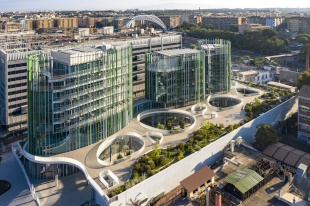
Application, Scholarship/Participation Fee
Deadline for application for the ESI Program 2024/25:
February 1, 2024 (12h. Madrid Time)
The ESI postdoctoral training program accepts applications from PhD holders regardless of their nationality or experience at academia or outside. Potential candidates should provide:
- Application Form including a research proposal (up to 2 pages). Download HERE
- Copy of PhD diploma or certificate, which confirms thesis defense.
- Short CV
- List of publications
Language Certificates
Applicants who are not native language speakers should provide a language certificate. For English language, international certificates are acceptable: Cambridge, TOEFL, and IELTS. However, if the candidate fails to provide a certificate, the language assessment will be part of the online interview after the application.
Scholarship/Participation Fee
We encourage you to apply for funding from your university or international funds. However, the long-term objective of this training program is to obtain funding for covering the operating costs thus providing full scholarship for each accepted candidate. For the time being the following options are offered:
Scholarships 2024/25
- Roberto Kertesz Full Scholarship
- 3 places available.
- Selected candidates will be fully released from fee. Free accommodation at the University campus during the research visit in Spain, Italy, or Poland.
Partial Scholarship:
- 30 places available
- Each accepted candidate will contribute 2,650 EUR in total.
- Travel, accommodation, or other costs are not included. However, at some of our host Universities, special prices for accommodation are provided.
Regular participation fee (without scholarship):
- 5 places availabe
- Tuition fee: 4,650 EUR in total.
- Travel, accommodation, or other costs are not included. However, at some of our host Universities, special prices for accommodation are provided.
The Participation Fee is paid at the beginning of the training program. The fee does not cover the travel and accommodation costs of the candidate nor the living expenses during the research stay.
For the online module fee please click here.
Get In Touch
ESI Postdoctoral Office:
University of Catania
Piazza Università, 2, 95124 Catania CT
Italy
Email Us
ESI Program Directors
European Scientific Institute, ESI
European Scientific Institute, ESI
ESI Program Directors at host institution:
-
Dr. Giovanni li VoltiUniversity of Catania, Italy
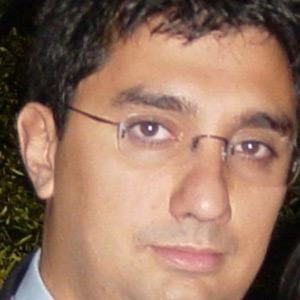
-
Dr. Przemyslaw StacCollege of Economics and Computer Science (WSEI), Poland
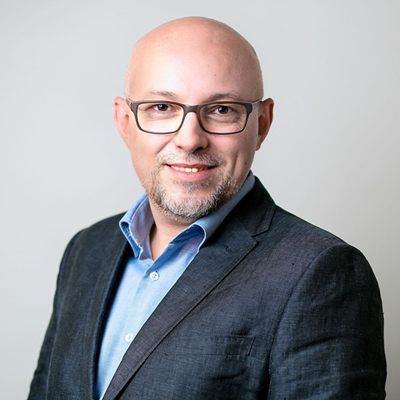
-
Dr. Carlos Efren MoraUniversity of La Laguna, Spain
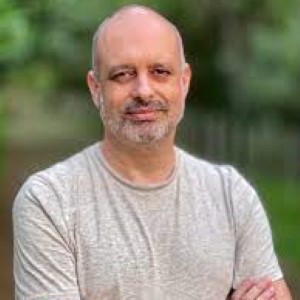
-
Dr. David Perez JorgeUniversity of La Laguna, Tenerife, Spain
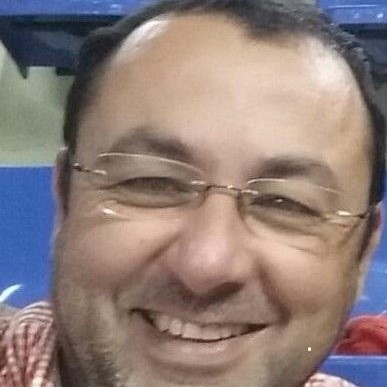

Dr. Giovanni li Volti

Dr. Przemyslaw Stac
Dr. Przemysław Stac holds a Ph.D.in Economics in the field of Management Science (Cracow University of Economics), and a master’s degree in American Studies (American Studies Center, University of Warsaw).
He is an academician with over 20 years of experience in teaching and scholarly research. Authored over 30 scholarly papers published in peer-reviewed journals. Currently, he has a permanent teaching position at the College of Economics and Computer Science in Cracow, Poland, where has also been Vice-rector for International Cooperation and Development since 2018.
His past academic responsibilities included Head of Marketing Department, Assistant Dean (acting Dean), Head of Postgraduate Studies, Head of International Cooperation Office, Organization-wide quality coordinator.
He worked for many institutions of higher education institutions in Poland and abroad. Lectured in Germany, Denmark, Kazakhstan. and the UAE.
Outside academia, he has been an active management consultant with a consulting company specializing in improvement and turnaround projects in mostly healthcare, chemical, IT industries., His field of expertise is change and performance management, and organization design and behavior. He has been involved in consulting projects in healthcare, IT, chemical, pharmaceutical, HoReCa, R&D, and automotive industries.

Dr. Carlos Efren Mora

Dr. David Perez Jorge
ESI Fellows (March 2021-June 2022)
Indisputably, education is the basic pillar in every society. The kind of education people receives gives them a refined behavior and helps them to earn a decent living, thereby contributing constructively to the society. In today’s global world where we all face unique challenges such as global warming and new viruses, the reform of the education system is imminent especially with the occurrence of the COVID-19 pandemic. This event imposed changes in all spheres of human life including the educational system. The switch to online lectures led to different challenges in different parts of the world. Some countries face some basic issues like Internet connection and lack of computers, while others are discussing the learning strategies and are focusing on the social and psychological implications of the students and the teachers as well. This research group will discuss the current challenges the educational system is facing with focus and research on the selected subdomains.
Chair:
Dr. Mary Ann Hollingsworth, University of West Alabama, USA
Members:
| Dr. Intakhab Alam Khan, Saudi Arabia | ||
| Dr. Aurela Saliaj, Albania | ||
| Dr. Raymond Arthur Chipfakacha, Zimbabwe |
ESI Program: October 2021 – December 2022
Chair:
Dr. Elena Hunt, Laurentian University, Canada
Members:
| Dr. Paul Kwame Butakor | ||
| Dr. Syed Mir Muhammad Shah | ||
| Dr. Tamar Kakutia |
ESI Program: March 2022 – June 2023
Chair:
Dr. Fernando Baragan, University of La Laguna, Spain
WG Members:
| Dr. Aisllan D Assis | ||
| Dr. Shazia Hasan | ||
| Dr. Umran Yazıcılar | ||
| Dr. Dhurata Lamcja |
| Dr. Enriko Ceko, Albnia | |
| Dr. Anca Tamas, Romania | |
| Dr. Delia Rusu, Romania. | |
| Dr. Volkan Dayan, Turkey |
| Dr. Nadia MANSOUR | |
| Dr. Vebina Resuli | |
| Dr. Seval ÖZBALCI | |
| Dr. Ilija Stojanovic |
| Dr. Ehsaneh Nejad Mohammad Nameghi | |
| Dr. Rashid Khalil | |
| Dr. Florin Aliu | |
| Dr. Jorge Cea Rodríguez |
The role of the state as a main actor in the international relations continues from the antique to the modern times. Despite some new trends imposed by globalization, the sovereign states are keeping the main role in the system. The COVID-19 pandemic has confirmed that the state is still the main actor regardless of the globalization and the numerous international governmental and nongovernmental international organizations. However, the pandemic opened dilemmas and challenges for the diplomatic relations. We can now speak about vaccination diplomacy – a term that has not been known before. All of the states today are struggling in dealing with the pandemic challenges altogether with the traditional diplomatic issues, politics, and economy. The state as a supreme institutional organization had to deal with the pandemic and impose some restrictions that are not always so popular between its own citizens. Additionally, the institutional capacities of a concrete country are not always sufficient and the necessity of international organizations and leadership is visible. This working group will discuss these issues and a topic for joint research will be selected.
Chair:
Dr. Eyal Lewin, Ariel University, Israel
Members:
Dr. Sila Turac Baykara, Turkey
Dr. Jorge Tenorio Fernando, Brazil
Dr. Ricardo Furfaro, Argentina
Chair:
Dr.Emilia Alaverdov, Georgian Technical University, Georgia
Members:
Dr. Andrej Semenov
Dr. Rasool Bukhsh Mirjat
Dr. Cenay BABAOGLU
Chair:
Dr. Francisco Flores, University of La Laguna
WG Members:
Dr. Daria Voyloshnikova
Dr. Maria Maclennan
| Dr. Eirini Artemi, Greece | |
| Dr. Salwa Alinat-Abed, Israel | |
| Dr. Dana Kaplan, Israel |
| Dr. Julijana Zhabeva | |
| Dr. Manotar Tampubolon | |
| Dr. Dorothy Ebere Adimora | |
| Dr. Miodraga Stefanovska – Petkovska |
| Dr. Dastan Bamwesigye, Uganda | |
| Dr. Sara Casamayor Mancisidor, Spain | |
| Dr. Eda Ustaoglu, Turkey |
| Dr. Satish Kumar Damodar | |
| Dr. Hamzo Khan Tagar | |
| Dr. Enkelejda Cenaj |
| Dr. Chrysoula Kapartziani | |
| Dr. Eda A. Genc | |
| Dr. Nino Kharitonashvili |
This interdisciplinary group is composed of academic experts in different fields such as pedagogy, feminism, and politics. It will hold meetings in Spanish language and will try to find joint interest in a specific topic setting the approach through interdisciplinary lances. This topic will be analyzed in the light of the COVID-19 pandemic and the challenges it brings to our contemporary modern society with the accent of the Ibero-American countries. Also, it will combine the different academic models when conducting research and will make the most out of the different but, at the same time, very similar academic domains.
Chair:
Dr. David Perez Jorge, University of La Laguna, Spain
Members:
| Dr. Marcela A. País Andrade, Argentina | |
| Dr. Karla Judith Ruiz González, Mexico | |
| Dr. Norma Pizarro,Mexico | |
| Dr. Eliazar Gonzalez Carrillo, Mexico | |
| Dr. Egon Elier Montecinos, Chile |
ESI Program: October 2021 – December 2022
Chair:
Dr. Eva Mateo, ULL, Spain
Members:
| Dr. Julio E. Benitez Telles | |
| Dr. JORGE BALLADARES BURGOS | |
| Dr. Seibo Alexise KOUAKOU IKOSSIÉ | |
| Dr. Favio Farinella | |
| Dr. SAMANTHA GONÇALVES MANCINI RAMOS |

